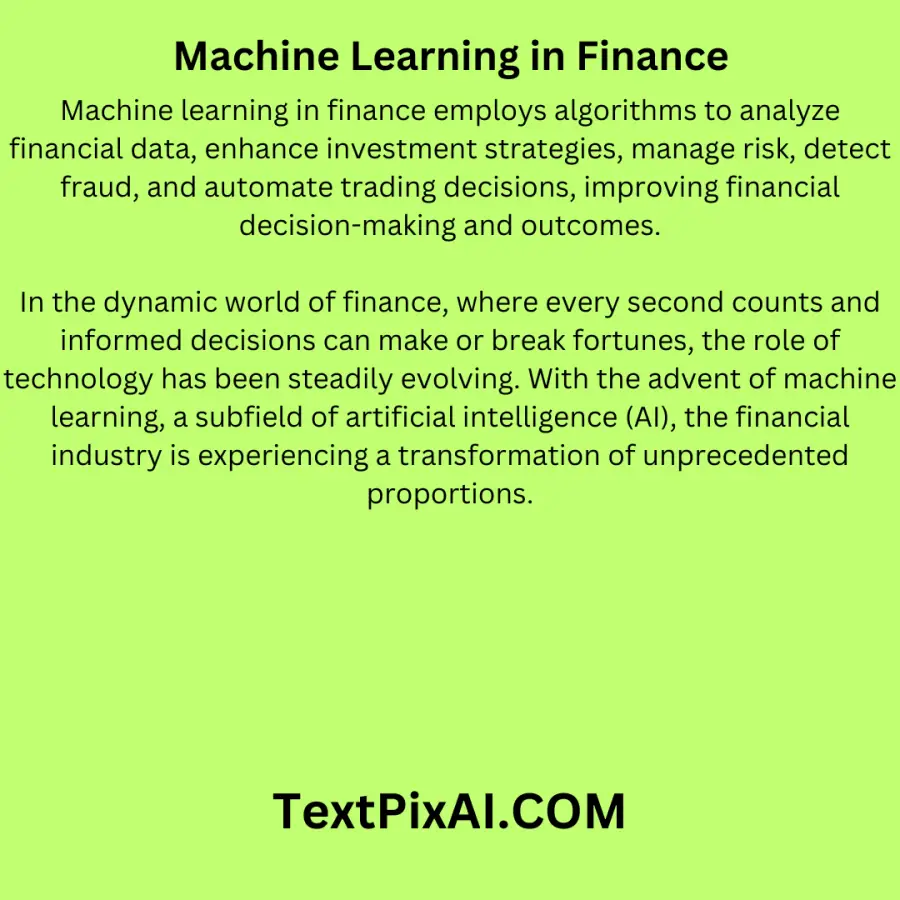Machine Learning in Finance
Introduction
In the dynamic world of finance, where every second counts and informed decisions can make or break fortunes, the role of technology has been steadily evolving. With the advent of machine learning, a subfield of artificial intelligence (AI), the financial industry is experiencing a transformation of unprecedented proportions. In this comprehensive exploration, we'll delve into the remarkable impact of machine learning in finance, ranging from algorithmic trading to risk management and beyond.
You may also like to read:
Machine Learning in Healthcare
The Role of Machine Learning in Finance
A Historical Perspective
To truly grasp the significance of machine learning in finance, it's essential to embark on a historical journey. The integration of technology in financial markets can be traced back decades, from the first computerized trading systems to the advent of electronic stock exchanges. However, the real game-changer arrived with the emergence of machine learning.
Machine Learning's Impact
In recent years, machine learning has become an integral part of the financial landscape. It enables institutions to process vast volumes of data, identify patterns, and make predictions at a pace and scale unimaginable before. As a result, it has paved the way for algorithmic trading, predictive analytics, and data-driven decision-making.
Understanding Machine Learning Basics
What Is Machine Learning?
At its core, machine learning is a branch of artificial intelligence focused on developing algorithms that can learn from data. Unlike traditional programming, where explicit instructions are provided, machine learning algorithms improve their performance through exposure to data. This adaptability is what makes machine learning so powerful in finance.
Supervised, Unsupervised, and Reinforcement Learning
Machine learning encompasses various paradigms, each suited to different types of problems. Supervised learning involves training a model on labeled data, making it ideal for tasks like predicting stock prices or credit risk. Unsupervised learning seeks to discover patterns in unlabeled data, relevant for clustering market segments or anomaly detection. Reinforcement learning, often associated with game-playing AI, has potential applications in optimizing trading strategies and portfolio management.
Data Preprocessing in Finance
In finance, data quality is paramount. Financial datasets are often noisy, inconsistent, and incomplete. Data preprocessing involves cleaning and structuring raw financial data to ensure it's suitable for analysis. This step is crucial because the quality of input data directly impacts the reliability of machine learning models.
Applications of Machine Learning in Finance
The applications of machine learning in finance are as diverse as they are transformative. Let's explore some of the key areas where machine learning is revolutionizing the financial landscape:
Algorithmic Trading
Machine learning algorithms are at the heart of algorithmic trading, where buying and selling decisions are executed at astonishing speeds. These algorithms analyze market data, identify trading opportunities, and execute orders with precision. The result? Increased trading efficiency, reduced transaction costs, and potential profit gains.
Risk Management
Risk management is a cornerstone of financial stability, and machine learning plays a crucial role in assessing and mitigating risks. Models powered by machine learning analyze credit risk, detect fraudulent transactions, and predict market fluctuations. Financial institutions can make more informed decisions, reducing the likelihood of catastrophic losses.
Portfolio Management
In portfolio management, machine learning algorithms assist financial professionals in constructing and managing investment portfolios. By analyzing historical market data and economic indicators, these algorithms can recommend optimal asset allocation strategies. The result is a more personalized approach to wealth management, catering to individual investor goals and risk tolerance.
Fraud Detection and Security
The financial sector is a prime target for fraud, but machine learning has become a formidable weapon against financial wrongdoing. Algorithms can detect anomalies in transaction patterns, identify potential fraudulent activities, and trigger alerts for further investigation. This proactive approach safeguards both institutions and customers.
Customer Service and Chatbots
Customer service in the financial industry has been enhanced through AI-powered chatbots. These chatbots can provide instant responses to customer inquiries, guide users through account management, and offer personalized financial advice. By streamlining customer interactions, financial institutions improve customer satisfaction and reduce operational costs.
Challenges and Considerations
Despite the remarkable potential of machine learning in finance, several challenges and considerations must be addressed:
Data Privacy and Security
The financial industry deals with highly sensitive customer data, making data privacy and security paramount. Compliance with regulations such as the General Data Protection Regulation (GDPR) and the Dodd-Frank Act is essential. Machine learning models must be designed with robust security measures to protect customer information.
Market Volatility and Model Risks
Financial markets are inherently volatile, and machine learning models are not immune to uncertainties. Market crashes or unexpected events can disrupt models that rely on historical data. Therefore, it's crucial to implement risk management strategies that account for model vulnerabilities.
Ethical and Legal Issues
Machine learning algorithms can inadvertently perpetuate biases present in historical financial data. This raises ethical concerns, particularly when these algorithms influence lending decisions or investment recommendations. Regulatory oversight and transparency are essential to ensure fairness and accountability.
Success Stories and Case Studies
The impact of machine learning in finance is best understood through real-world examples:
Renaissance Technologies' Medallion Fund
Renaissance Technologies, a hedge fund founded by mathematician James Simons, is renowned for its use of machine learning and quantitative strategies. The Medallion Fund, exclusively available to employees, has consistently delivered exceptionally high returns. Machine learning plays a pivotal role in identifying profitable trading opportunities.
JPMorgan Chase's COIN
JPMorgan Chase employs machine learning in its Contract Intelligence (COIN) platform to automate the analysis of legal documents. This reduces the time and effort required for contract review and helps the bank manage its massive document archives more efficiently. COIN is a testament to how machine learning can enhance operational efficiency.
Robinhood and Fintech Innovations
Fintech platforms like Robinhood have disrupted the financial industry by leveraging machine learning for personalized investment recommendations. These platforms offer users the opportunity to invest in stocks, cryptocurrencies, and other assets with user-friendly interfaces and real-time data insights.
Future Directions and Emerging Trends
The future of machine learning in finance is teeming with exciting developments:
Explainable AI in Finance
The interpretability of machine learning models is critical in finance, where decisions have significant consequences. Researchers are actively working on techniques to make AI models more transparent and interpretable. This ensures that financial professionals can understand and trust the recommendations made by machine learning algorithms.
Quantum Computing and Financial Modeling
Quantum computing, a nascent technology, holds the potential to revolutionize financial modeling. Quantum algorithms can solve complex optimization problems at speeds unattainable by classical computers. This opens new avenues for portfolio optimization, risk assessment, and derivative pricing.
Decentralized Finance (DeFi) and Blockchain
Machine learning is also making its mark in the world of decentralized finance (DeFi) and blockchain. These technologies offer opportunities to create decentralized financial ecosystems, where smart contracts and machine learning algorithms facilitate lending, trading, and asset management without intermediaries.
Tools and Frameworks
For those eager to explore the intersection of machine learning and finance, several tools and frameworks are at your disposal:
Python and Libraries
Python is the language of choice for many data scientists and financial analysts. Libraries like NumPy, pandas, and scikit-learn provide a robust foundation for financial data analysis and modeling.
TensorFlow and PyTorch
For deep learning applications in finance, TensorFlow and PyTorch offer versatile frameworks with specialized libraries tailored to financial modeling and time series analysis.
Conclusion
The integration of machine learning in finance is not merely a technological advancement; it's a fundamental shift in how financial institutions operate. From algorithmic trading to risk management and customer service, machine learning is driving efficiencies, reducing risks, and enhancing customer experiences. However, as with any transformative technology, it also presents challenges that must be navigated with care.
References and Further Reading
For those eager to dive deeper into the world of machine learning in finance, here are some recommended resources:
- Machine Learning for Trading
- The Use of Artificial Intelligence in Financial Services
- Quantum Computing in Finance: A Review of the Current Landscape
- Decentralized Finance (DeFi): An Overview
Machine learning is not just a tool; it's a catalyst for change in the financial world.








